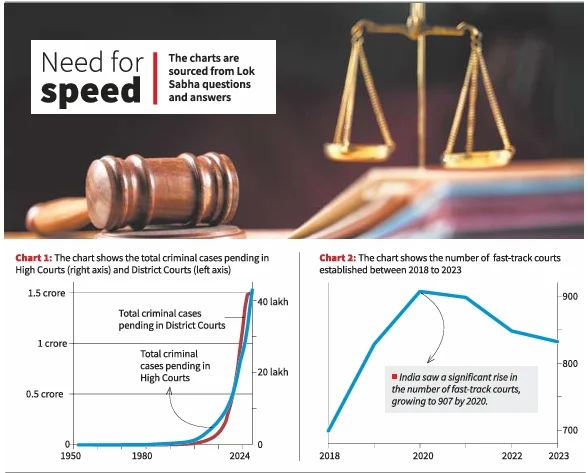Social Justice
Effectiveness of Fast Track Special Courts
- 08 Oct 2024
- 8 min read
For Prelims: Fast-track courts in India, sexual offenses, Protection of Children from Sexual Offences Act (POCSO Act), Criminal Law (Amendment) Act in 2018, Centrally Sponsored Scheme, judiciary.
For Mains: Challenges of Fast-track courts in India.
Why in News?
India's Fast-Track Courts, designed to expedite serious criminal cases, are facing scrutiny over their effectiveness. Despite an initial surge, the number of operational courts has declined.
Note:
- Trends in the Number of Fast-Track Courts:
- Between 2018 and 2020, India saw a significant rise in the number of fast-track courts, from 699 to 907, largely in response to public outcry over delays in high-profile cases.
- However, this progress has slowed since 2020, with the number of functional courts dropping to 832 in 2023, reflecting the challenges states face in maintaining these courts due to financial and administrative constraints.
- Disparities in Fast-Track Court Availability:
- While states such as Uttar Pradesh, Maharashtra, and Tamil Nadu have maintained a high number of operational fast-track courts, others have far fewer or, in some cases, none.
- These disparities are a reflection of local resource limitations, varying levels of prioritization, and differing administrative capabilities.
What are FTSCs?
- About:
- FTSCs are judicial bodies established in India to expedite the trial process for cases pertaining to sexual offenses, particularly those involving rape and violations under the Protection of Children from Sexual Offences Act (POCSO Act).
- Establishment:
- The Central Government enacted the Criminal Law (Amendment) Act in 2018, introducing stringent penalties, including the death penalty for perpetrators of rape. Following this, FTSCs were instituted to facilitate the swift adjudication of such cases.
- The initiative to establish FTSCs was formalized in August 2019 as a Centrally Sponsored Scheme, in accordance with directives from the Supreme Court of India.
- Reasons for Establishing FTSCs:
- The FTSCs was established in response to the alarming rise in sexual offenses and the prolonged duration of trials in conventional courts, which led to significant delays in delivering justice to victims.
- Extension of the FTSCs:
- The FTSCs Scheme, originally launched for one year in 2019, has been extended by the Union Cabinet for an additional three years, from 2023 to 2026.
What is the POCSO Act?
- About: The law aims to address offences of sexual exploitation and sexual abuse of children. The Act defines a child as any person below the age of 18 years.
- It was enacted in consequence to India’s ratification of the UN Convention on the Rights of the Child in 1992.
- Features:
- Gender-Neutral Nature: The Act recognises that both girls and boys can be victims of sexual abuse and that such abuse is a crime regardless of the gender of the victim.
- Confidentiality of Victim’s Identity: Section 23 of the POCSO Act, 2012 mandates that the identity of child victims must be kept confidential.
- Media reports cannot disclose any details that could reveal the victim’s identity, including their name, address, and family information.
- Mandatory Reporting of Child Abuse Cases: Sections 19 to 22 compel individuals who have knowledge or reasonable suspicion of such offenses to report them to concerned authorities.
What are the Challenges Faced by FTSCs?
- Infrastructure Deficiencies: Fast-track courts often operate in inadequately equipped facilities, lacking necessary resources such as modern technology and sufficient space to handle case loads efficiently.
- Judicial Overload: Despite their purpose, fast-track courts frequently experience overwhelming case volumes, leading to delays that contradict their foundational objective of expedited justice.
- Inconsistent Implementation: The establishment and functioning of fast-track courts can vary significantly across states, resulting in uneven access to justice and inconsistent application of legal standards.
- Quality of Judicial Personnel: The recruitment and training of judges and support staff may not always align with the specialized needs of fast-track courts, impacting the quality of judicial decision-making.
- Limited Public Awareness: There exists a general lack of awareness among the populace regarding the functions and processes of fast-track courts, which can hinder their effectiveness and accessibility.
Way Forward
- Infrastructure Development: Invest in the modernization and expansion of court infrastructure to ensure that fast-track courts are equipped to handle caseloads.
- Comprehensive Training Programs: Implement targeted training programs for judges and support staff to enhance their skills, focusing on the complexities of cases typically handled by fast-track courts, such as those involving sensitive issues.
- Streamlined Judicial Processes: Establish clear procedural guidelines and best practices to ensure efficiency while maintaining the integrity of the judicial process, facilitating quicker resolutions without compromising fairness.
- Public Awareness Campaigns: Launch initiatives to educate the public about the functions, processes, and benefits of fast-track courts, fostering greater community engagement and trust in the judicial system.
- Legislative Reforms: Advocate for amendments to existing laws to support the unique operational needs of fast-track courts, ensuring that procedural frameworks align with their objectives.
|
Drishti Mains Question: Critically evaluate the role and effectiveness of Fast Track Special Courts (FTSCs) in India. |
UPSC Civil Services Examination, Previous Year Question (PYQ)
Mains:
Q. The judicial system in India and the UK seem to be converging as well as diverging in recent times. Highlight The key points of convergence and divergence between the two nations in terms of their judicial practices. (2020)
Q. From the resolution of contentious issues regarding distribution of legislative powers by the courts,‘Principle of Federal Supremacy’ and ‘Harmonious Construction’ have emerged. Explain. (2019)





